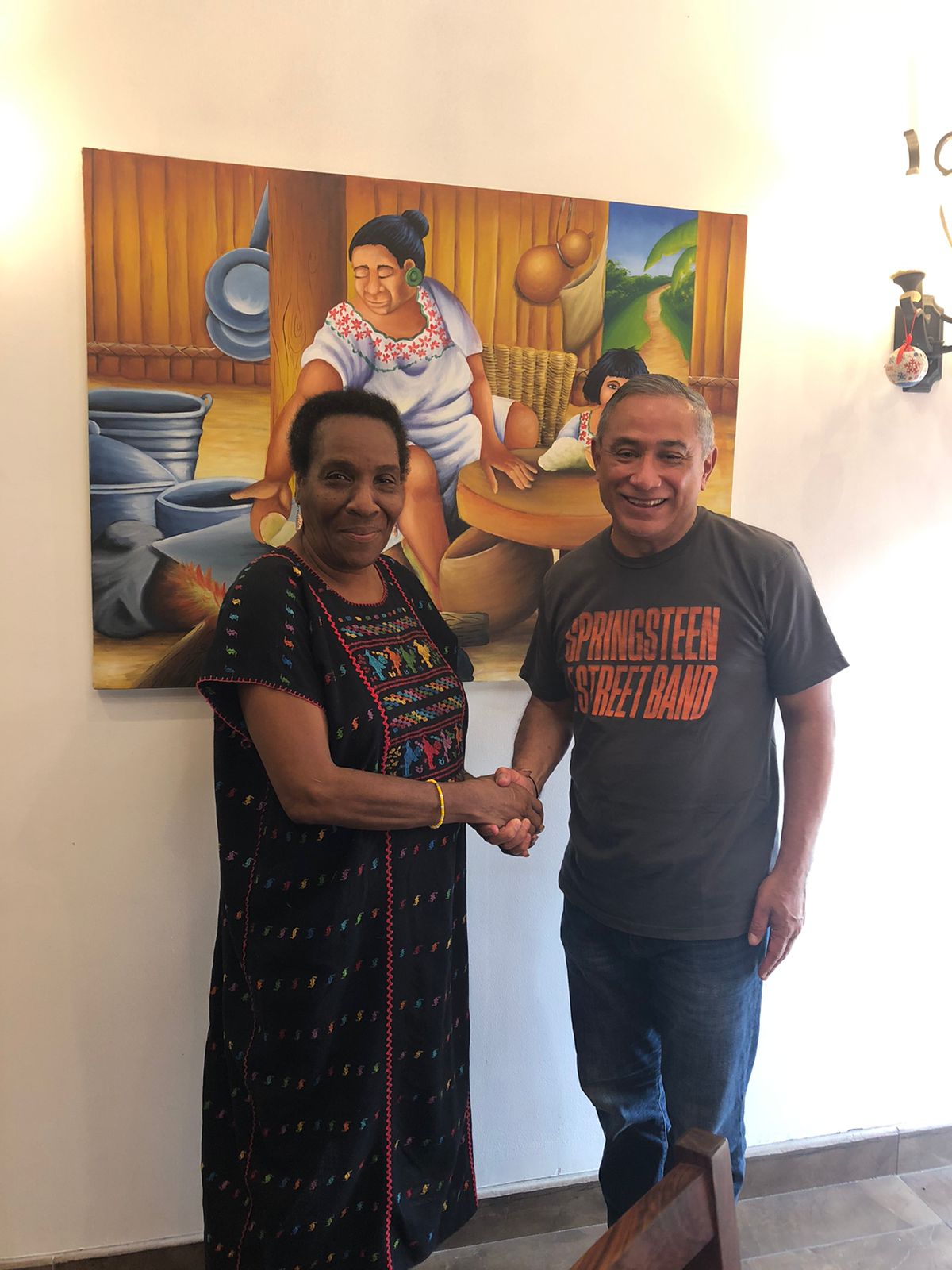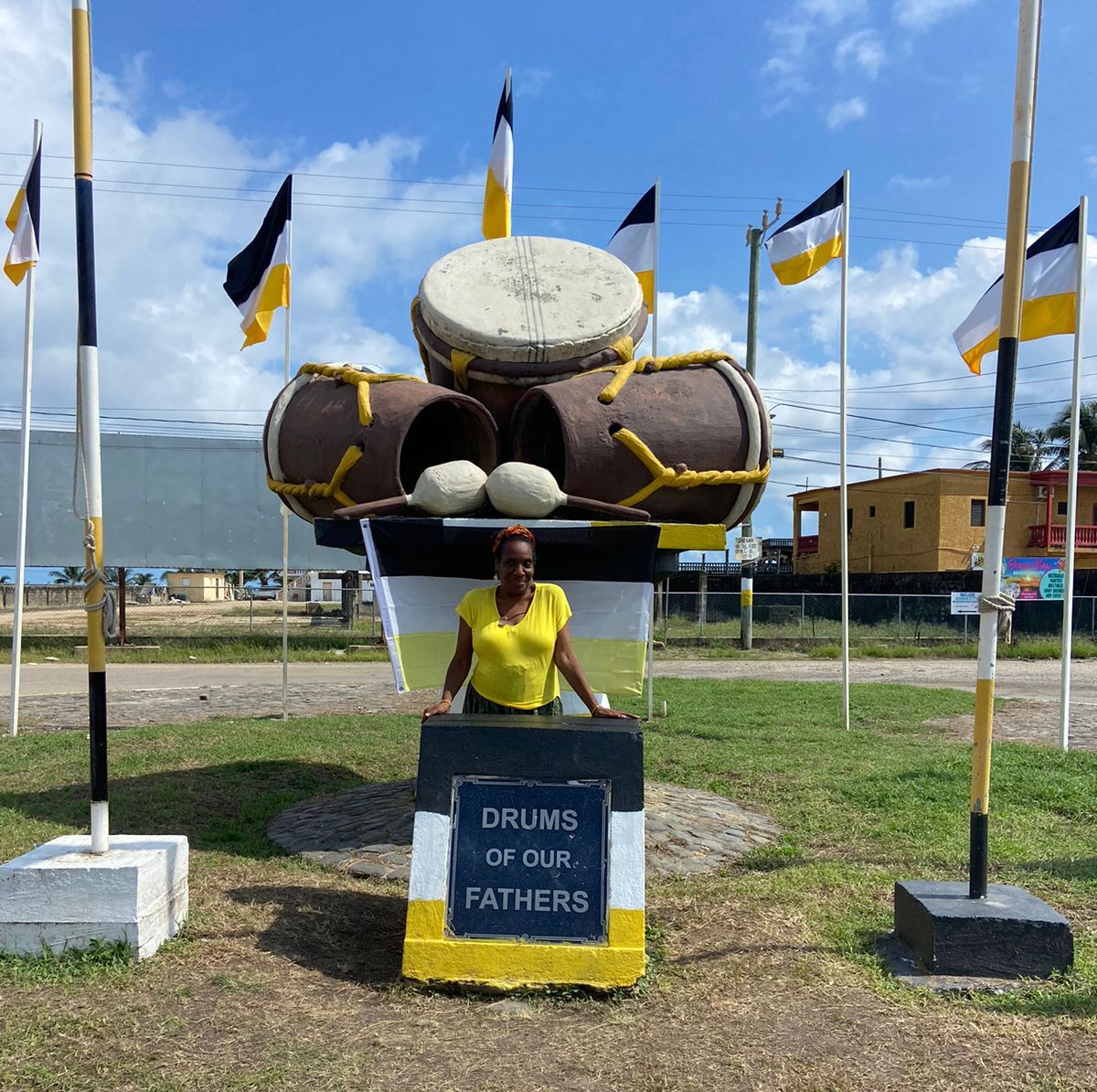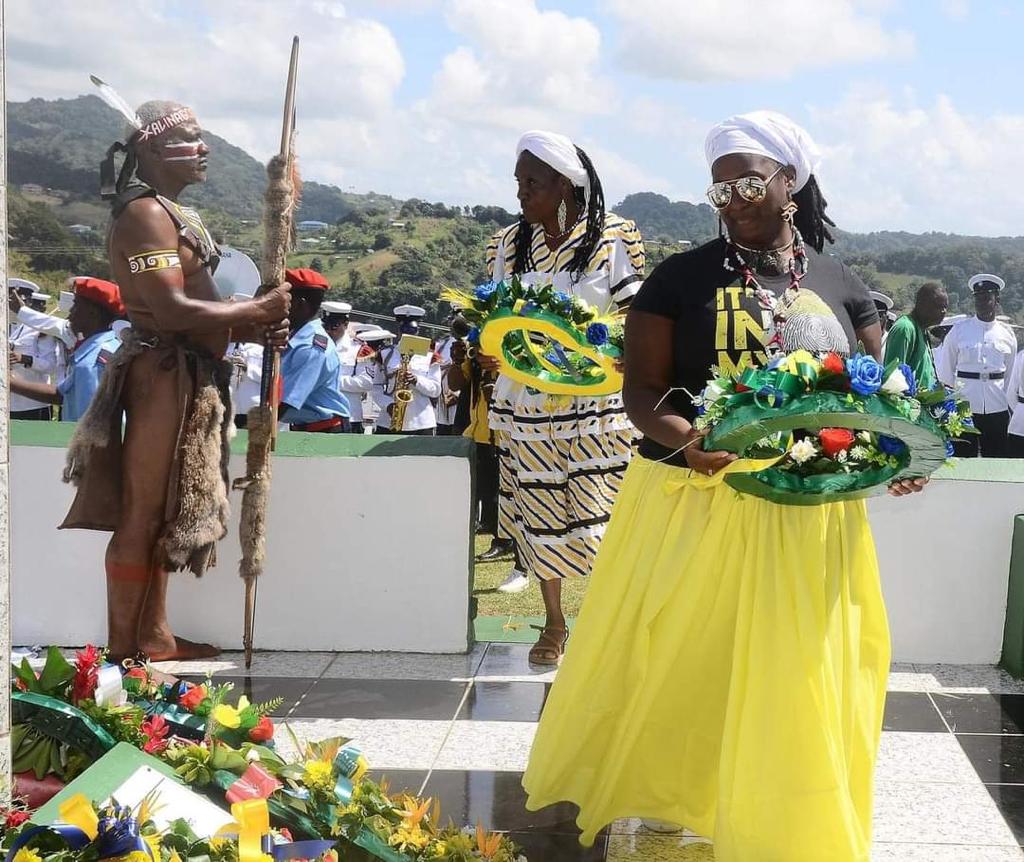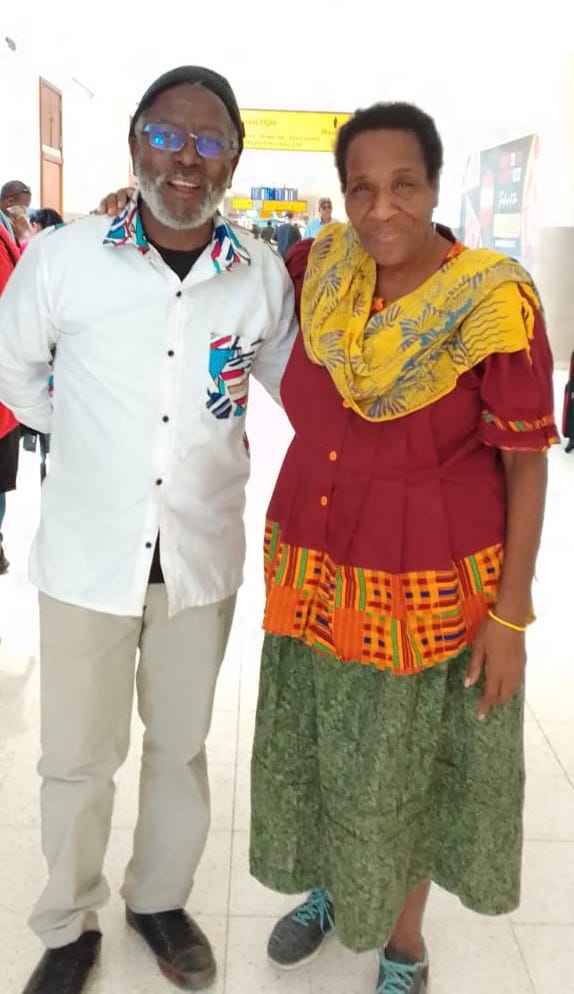The Indigenous Knowledge of The Garifuna
A conversation with Her Excellency, Ambassador Cynthia Ellis-Topsey
December 11, 2023
The Repair Campaign engaged in a conversation with Her Excellency, Ambassador Cynthia Ellis-Topsey, renowned as the Queen of the Godsman Ellis Centre for Garifuna Culture, also serving as the executive director of the newly established institution. Seeking her insights on Garifuna representation, we delved into her personal background.

Ambassador Ellis-Topsey hails from Belize, born to Garifuna parents Godsman Celestino Ellis (father) and Ethel Bernadine Ellis (mother) in the Maya village of August Pine Ridge, nestled close to Mexico. Interestingly, she came into the world under the care of a Maya midwife. Her lineage traces back to pioneering ancestors who, in collaboration with African-American women enslaved and brought to Belize by the Catholic Church, played a pivotal role in establishing schools in rural Belizean communities. They mentored Garifuna individuals to serve as missionaries in Maya communities, fostering educational development.
Her journey took a turn at the age of 12 when she embraced a global perspective, aspiring to be an astronaut. Her outlook, marked by a fearless embrace of limitless possibilities, echoes the nomadic spirit of the Garifuna people. Recognising her calling early on, Ambassador Ellis-Topsey has always gravitated towards young people, emphasising mutual learning and acknowledging the visionary potential within every child.
Central to her narrative is the establishment of the Godsman Celistino Ellis Center for Garifuna Culture. Born out of a deep-seated commitment to preserving and promoting Garifuna heritage, this cultural centre stands as a testament to her dedication. Through its presence, Ambassador Ellis-Topsey aims to create a space where the vibrant tapestry of Garifuna culture can thrive, fostering intergenerational exchange and cultural appreciation. In her words, the centre becomes a beacon, not just to teach, but to facilitate a dynamic dialogue where the wisdom of the past converges with the vision of the future.


Can you tell us some more about the work you do in communities?
My mission and purpose is to have the voice of the Indigenous people, specifically Garifuna, heard from our perspective and to bring our people and our leadership together, especially young people.
I recently launched a centre for Indigenous people under the name of Godsman Celestino Ellis Centre for Garifuna Culture, after my dad, who was a visionary and pioneer and who influenced me in doing what I do. Because I was brought up by the village, everything I do is in honour and acknowledgement of our ancestors and those who have come before us and cleared the path.
I am a mentor for a lot of young people and leaders around the country and the region. We also work to improve the quality of life of people through developing the capacity of leaders to take up responsibility. I travel countrywide with all the communities, Maya, Garifuna, Creole, Mestizo, and all the different groups, bringing people together and creating a space to listen and learn from one another. This is what I saw my parents do and I continue to do the same.
My work focuses on areas of health and wellness, sustainable and economic development, mentoring and coaching, and improving Indigenous representation.
It is important to bring Indigenous voices to the table to speak about Indigenous stories from our own perspective.
How has history shaped your identity?
The Garifuna have a unique history because we are a free people. We were not enslaved.
When the Catholic Church came from New Orleans to mentor the Garifuna people they did not want to bring non-African people to minister to the Garifuna because we were free.
I have Maya in me as well and we were a nation long before the Europeans came. We have the language now to acknowledge that. In fact, we are going through somewhat of a cultural renaissance of speaking truth to reality, which is that we are a nation before these entities called ‘countries’ were formed. Before colonisation, there were Maya who were all over Central America. Yucatec Maya, Qʼeqchiʼ, and Bopan. And the same thing with the Garifuna. We are a nation.
Joseph Chatoyer, a Garifuna chief and freedom fighter, is the only national hero for St. Vincent and the Grenadines.
With those facts, we can affirm who we are. We have been declared by the United Nations as one of the ‘Masterpieces of the Oral and Intangible Heritage of Humanity’ in terms of our intangible resources, in 2001.
And so as we celebrate November 19th as the arrival of the Garifuna people here to Belize, then we have the ability to share these facts and to really remind ourselves and others that we are a youth people.
So through this journey, I have learned to celebrate, affirm and acknowledge our sense of self and identity.


You mention the Garifuna were never enslaved, but in what nuanced ways does the legacy of chattel enslavement and colonialism still impact Garifuna communities?
That is a very good question because to say that we are not enslaved doesn’t mean that we are to be arrogant. We have celebrations and we have a sense of ourselves and identity, but when you look at the conditions of life of our people in our communities, it’s clear that the quality of our lives, like many indigenous people, is below level.
Because we were encroached upon by colonial powers and certainly through the United States’ involvement through the doctrine of discovery, we were impacted when it comes to land ownership.
In the decolonisation process, there are some who have compromised our position and our communities by aligning with existing systems and structures, which really challenge our authenticity and ability to remain truly Garifuna in a sense.
We are only recently beginning to challenge the encroachment of our lands.
In particular, we align with the Maya who took a case to the Caribbean Court of Justice for our land rights and we won at the Caribbean Court of Justice. The Maya won. And because we aligned with the Maya as indigenous people, we as Garifuna are also looking at ways in which our lands have been encroached on.
It’s a really and powerful conversation that we are having concerning the erosion of our lands based on so-called tourism development. Our lands on the coastal zone have been compromised in the name of ‘development’ and the building of resorts and tourism development programs.
We settle on the sea on the coast of the Garifuna, and our lands are sacred, including the sea and air. There are certain areas of the sea that are very sacred to us for our rituals and our spiritual development. So when governments develop these projects without consulting or having conversations with us, that is an abuse of our integrity and dignity as a people who are here and were here before the Europeans.
Speaking not only on behalf of Garifuna but also Belize, I find that we are not truly integrated and understood in the Caribbean in terms of our distinctiveness. Belize is part of Central America and also part of the Caribbean. And yes, we are part of CARICOM and in fact, the Secretary-General for CARICOM is a Belizean. But when it comes to real engagement of the Belizean landscape by the institutions of the region, I don’t see or know of any articulation of Garifuna or Maya or Indigenous people, for example in our learning institutions like the University of the West Indies or any of the entities that exist.
I had a conversation with a representative of the Caribbean Development Bank a couple of months ago and they were inviting us to a conference. I said to them, I would like to invite you to a fact-finding mission of us Indigenous people, where you can have a series of town hall sessions where you listen to the Indigenous perspective before making your plans and your projects and your programs. And so they were very amazed because we are proposing a reversal of the approach. The person from the Caribbean Development Bank said that in their 40 years of existence, they are now beginning a conversation about Indigenous involvement.
Whilst I applaud that revelation and understanding, the approach needs to be one of listening and consulting the Indigenous perspective and way of being. As Indigenous people, we have a lot of knowledge and wisdom that others can learn from. Not from an arrogant perspective that they know everything. But from a place of inviting these entities to be a part of a conversation with listening because there’s a lot of catch-up to go through.


What would you like to say to someone just learning about the Garifuna for the first time?
Well, the main thing I want to communicate is that their way is not the only way and that there are different ways of knowing and being. We as Garifuna have a body of knowledge and practice from which the institutions can learn.
Universities can learn a lot from our practices and disciplines, for example, the knowledge and use of plants for food and healing. Take cassava bread for example. We process the cassava in a very unique and amazing way. Cassava bread is gluten-free and there are many people speaking about gluten-free food right now, but we have had those ancient ways for a long time. And our cassava bread is one that lasts forever, it doesn’t spoil because of the way in which it is made. There are many, many bodies of knowledge like these that we have that could contribute to learning.
We invite the people of the Caribbean to join the United Nations in embracing and learning the strength and the capacity of the Garifuna people and our alignment with indigenous people in the Caribbean, like the Maroons.
Stop saying that we don’t exist. People were suggesting that the Maya disappeared, or the Taino and the Arawak people have been killed or no longer exist. Those are very disrespectful statements that are being made about our people. Instead, we would like to invite a different paradigm: a radical paradigm shift where we can be respected and honoured as nations in our own right because we were here first.
We invite our brothers and sisters from other Caribbean nations to join in affirming that we as a people resisted genocide where thousands of us were slaughtered and are still fighting for our sacred lands. Many Garifuna people are still being murdered for our land. But we rather die than be enslaved. Let us be inspired by the resilience and authenticity of the Garifuna people to do the right thing and not to compromise. As Bob Marley said, “emancipate ourselves from mental slavery”. We have a lot of work to do as Garifuna people but we welcome our brothers and sisters to stand with us.
What is your hope for the future?
My hope is the affirmation of Indigenous leadership in a way that honours and respects that there are different ways of knowing and different ways of being.
Garifuna have much expertise and knowledge of medicine and healing, which tends to be appropriated from us, taken to other parts of the world, repackaged and sold back to us.
Our knowledge of nature, the environment, and the conversation about climate change has a lot to learn from our ancient ways of being. Before GPS we had different capacities to navigate by connecting with the earth, the sky and the water. It is disrespectful when that information is appropriated from us, repackaged and promoted as if it came from other cultures.
My desire is to welcome other people who want to learn, especially young people and children.
But we are commanding the respect that we are our own nations.
So my message is: Be wise and don’t compromise!
